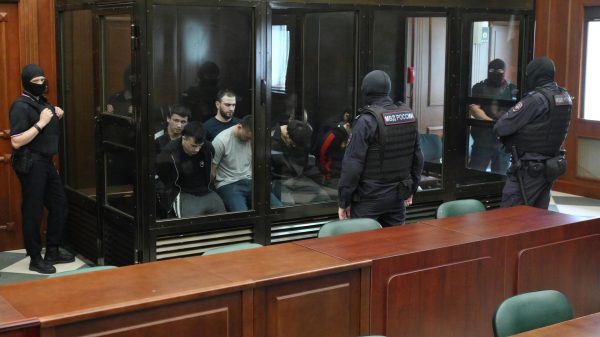At least 331 human rights defenders promoting social, environmental, racial and gender justice in 25 countries were murdered in 2020, with scores more beaten, detained and criminalised because of their work, analysis has found.
Latin America, the most dangerous continent in the world in which to protect environmental, land and human rights, accounted for more than three-quarters of all the murders of human rights defenders in 2020. In Colombia, where activists are routinely targeted by armed groups despite a 2016 peace deal, 177 such deaths were recorded, more than half of the global total. The Philippines was the second deadliest country with 25 murders, followed by Honduras, Mexico, Afghanistan, Brazil and Guatemala.
While the majority (69%) of those killed were working on environmental, land or indigenous peoples’ rights, activists also found themselves being targeted simply for providing Covid-19 relief to their communities, according to a report published on Thursday by the advocacy group Front Line Defenders (FLD).
In a year when many countries implemented lockdown measures to help stem the spread of the pandemic, human rights defenders provided much-needed support by delivering PPE, medicines and food to sick and elderly people, filling in gaps left by their governments. Despite this assistance – or perhaps because of it – they faced a variety of reprisals, ranging from arrest and harassment to physical violence and murder, said FLD’s head of protection, Ed O’Donovan.
“The Covid-19 pandemic exposed many failures in many societies – notably systemic inequalities and failures of government to provide effective services to its citizens, which is sometimes by design,” O’Donovan said.
“Much of this can be traced back to corruption and undemocratic systems in which transparency and accountability are anathema to the interests of the ruling elites, both political and economic. Human rights defenders and civil society have been filling those gaps – despite still being targeted – offering services and an alternative vision for societies.”
O’Donovan said it was no surprise that in the Americas, activists working on impunity and justice issues suffered the second highest figure of violations against them, after those working on indigenous, land and environment rights.
Twenty human rights defenders working on anti-corruption were also killed in 2020 – the highest figure ever documented by FLD.
The report also found that:
-
Indigenous activists made up nearly one third of the total of 331 human rights defenders killed worldwide, even though indigenous peoples comprise only about 6% of the global population
-
A significant number of those murdered were working to stop extractive industry projects. They included the South African environmental activist Fikile Ntshangase, who was shot dead after opposing the extension of a coalmine near her home
-
13% of all those recorded killed were women
-
Six transgender human-rights defenders were killed in 2020, all of them in the Americas
While Covid-19 stalled some of the momentum of protest movements started in 2019, human rights defenders helped to remobilise, and in some countries, start movements during the last half of 2020, the report says. In Poland, activists fought for reproductive rights; in Bulgaria, they countered the corruption of the political elite; in the US, protests erupted over systemic racism; in Hong Kong, activists took to the streets to fight the introduction of an “Orwellian” national security law.
That fewer countries were responsible for a higher number of deaths of human rights defenders in 2020 than 2019 – 331 killings in 25 countries last year compared with 304 killings in 31 countries in 2019 – proves that impunity reins when it comes to crimes against activists, even amidst widespread lockdowns and a global pandemic, said O’Donovan.
“Human rights defenders are always at risk and the lack of accountability and prosecution for their killings leaves virtually no cost for perpetrators,” said O’Donovan, adding that a handful of countries – among them Afghanistan, Colombia and Peru – were responsible for significant increases in murders in 2020.
“In Peru, killings have increased from one in 2018 to eight in 2020; 75% of those killed in 2020 were indigenous, while all were working on land or indigenous issues, meaning that most, if not all, were located in more remote areas and up against corporate and state actors seeking control over land and natural resources,” said O’Donovan.
UK failing to protect human rights defenders abroad, says Amnesty
Read more
“In Colombia, armed groups enforced their own Covid-19 checkpoints and patrols in areas they control, thus exposing human rights defenders to greater risk.”
The report comes in the same week that Amnesty International accused the UK government of failing on their pledge to protect human rights workers overseas. It said health workers, lawyers, journalists and rights activists around the world struggled to get support from British embassies.
The FLD made a special note of both China and India’s “attempts to reduce and reframe normative human rights standards” on the global stage. The report also underlined China’s ongoing persecution of its Muslim-majority Uighur population, which has resulted in mass arbitrary detentions and surveillance, forced labour, forced sterilisation of Uighur women, and the death of at least one Uighur human rights defender, Tursun Kaliolla, a former civil servant who died in December 2020 while in custody in Xinjiang.
FLD’s deputy director Olive Moore said that the 2020 figures demonstrated an “unconscionable” trend of violence against activists, and called for human rights defenders to be included in governments’ post-Covid planning, and at the Cop26 climate talks scheduled for November this year.
“While 2020 was a difficult year for everyone, it was especially challenging for human rights defenders, who rose to meet unprecedented challenges. They faced increased attacks, economic insecurity, and the impact of illness and death on their communities, yet worked to fill voids left by insufficient government responses to the pandemic,” said Moore.
“That they are under attack, as detailed in this report, is unconscionable.”





















































Свежие комментарии